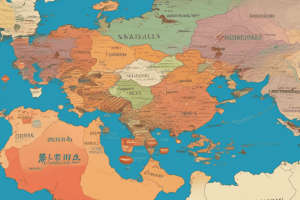Podcast
Questions and Answers
Study Notes
Sanctions Regime Types, Goals, Prohibitions, and Effects
- Sanctions are the "deliberate, government-inspired withdrawal, or threat of withdrawal, of customary trade and financial relations with a target country in an effort to change that country's policies."
- Sanctions are often self-enforced, relying on voluntary compliance, unlike military measures.
- Economic sanctions are typically employed to achieve political goals, although economic objectives might also be secondary.
- Common objectives of sanctions include denying resources for activities like terrorism or narcotics trafficking, and compelling a target to change practices.
- Sanctions can be imposed unilaterally (by a single country) or multilaterally (by multiple countries, including the United Nations).
- Countries may collaborate with allies to impose sanctions, as seen in the U.S. and EU sanctions against Russia following the events in Ukraine in 2015.
- Sanctions are formalized through legal acts, which vary by country and may include laws, regulations, executive orders, administrative guidelines, and/or judicial decisions.
- Sanctions laws cover the types of sanctions, target individuals, entities, or even entire countries, who must comply, and what penalties exist for non-compliance.
Imposers of Sanctions
- Sanctions can be imposed by any level of government (federal or state level)
- The totality of a country's sanctions laws is known as a 'sanctions regime.'
- Individual nations or a group of nations can impose sanctions.
Subjects of Sanctions
- Sanctions can target entire countries or specific regions within a country.
- Sanctions directed at nations may be applied to individuals and/or organizations within that country or nationality abroad.
Common Types of Sanctions
- Secondary Sanctions: Also called extraterritorial sanctions, they extend the power of U.S. law, sometimes indirectly, to non-U.S. firms.
- Penalties: Common penalties for failing to comply with sanctions include fines and the requirement for organizations to strengthen their internal sanctions compliance systems.
- Administration: The administering agency varies among countries, possibly a dedicated agency or an existing agency responsible for overall functions.
-
Broad or Targeted Programs: Sanctions programs can range from prohibiting most transactions to only specific products, such as arms.
- Embargos are broad programs prohibiting nearly all transactions.
- Prohibitions or Restrictions on Investment: A country may prohibit or limit investment in another country, such as by prohibiting new investment.
- Prohibitions on Imports: Imports from the target country or region might be prohibited.
- Prohibitions on Exports: Exports are also a common form of sanctions.
Prohibition or Restrictions on Exports
- Prohibitions on exports can be all-inclusive or specify particular items, such as agricultural products or medicines.
Prohibition or Restrictions on Investment
- Arms Embargos are common types of sanctions often imposed, affecting military technologies and equipment.
- Specific Product Embargos: Sanctions can target specific products, like bullion, precious metals, luxury goods, or petroleum.
- Prohibitions or Restrictions on Investments: Country may prohibit or restrict investment in another country, generally.
Prohibition on Providing Economic Resources
- This sanction targets individuals and institutions with economic resources.
Circumvention and Facilitation
- Reporting Requirements: In some instances, sanctions don't prohibit transactions but require reporting, such as in cases involving publicly traded companies.
- Facilitation: This involves assisting foreign individuals or entities to conduct prohibited actions.
- Circumvention: A situation where sanctions are violated
- Reporting Requirements: Some sanctions regimes require reporting of transactions to the sanctioning country.
Family Remittances
- Common exemptions for sanctions include transactions related to mail, telecommunications, humanitarian donations, family remittances, and overflight priveleges.
Medicine and Medical Products
- Medical-related exemptions are common.
Travel and Travel Expenses
- Travel policies connected to sanctions vary.
Miscellaneous Sanctions
- Sanctions are imposed often to change a nation's behavior or government, not to punish the general population.
- Sanctions typically target persons, companies, and countries.
- A sanction's goals may include halting activities like terrorism or supporting or dealing in narcotics.
- Penalties include fines and imprisonment.
- Sanctions sometimes come in the form of licenses, which are exemptions permitting a transaction that would usually be prohibited.
- Sanctions are not always universally applied, and details on enforcement may differ by country.
- The totality of a country's sanctions laws, including topics like who is subject to sanctions, the agency handling enforcement, and penalties, is known as a 'sanctions regime'.
Studying That Suits You
Use AI to generate personalized quizzes and flashcards to suit your learning preferences.
Related Documents
Description
This quiz explores the various types of sanctions, their goals, prohibitions, and effects on targeted countries. Understand the nuances between economic and political objectives, and the methods of enforcement. Learn about unilateral and multilateral sanctions and specific cases like the U.S. and EU actions against Russia.




